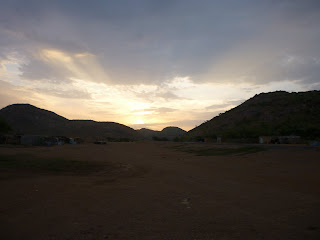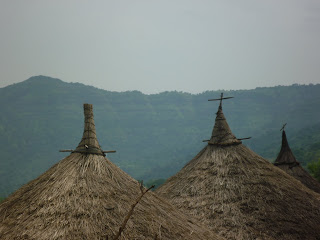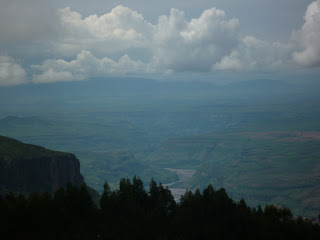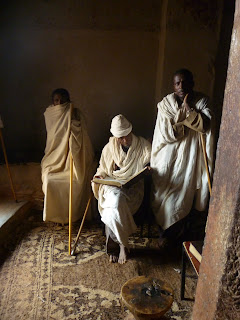




Before dawn I am riding again, between the imposing steel pillars of a shiny new bridge, over to the east bank. The road leaves the river and soon I am flanked by two vast expanses of mustard dust. I stop and sit on the pebbled verge off the road and eat some biscuits and watch a green lorry trundle past. It turns into the desert and dumps a boot-load of rubbish into the sand. Bottles and plastic bags and torn wrappers cartwheel across the dust, spinning and tumbling towards me in the breeze.
I ride into the wind, heat streaming from the blazing sun. I am hot and I see a cafeteria ahead and pull off the road. Beneath the shade of tarpaulins men smoke on bubbling shishas and I fill my bottles from cool stone urns with water the colour of milky tea, thick with Nile silt. Outside a generator whirs loudly and a battered green LandRover stands on flattened black tyres. I lie on a rope bed and my mum calls from home and wishes me a happy birthday. We talk for a long time, while all around men are washing their feet and beginning to pray. An old man edges his way into the shade, pressing his gold-leafed cane carefully into the sand with each step. His eyes twinkle like bright butterflies beneath his white turban and he comes over and shakes my hand. 'My dear, you are welcome in Sudan. Do you have something cold to drink? This is your bicycle. This is very good.' He tells me I must rest until the sun is lower and to be careful for hyenas: 'You will see their eyes in the dark from the road.'
The wind drops later in the day and I ride fast through the rocky desert plains. There are granite boulders strewn across the sand and mounds of purple scree sloping into the dust. I follow the road through the dusty hills and rejoin the palm-lined river. The sun begins to set, reducing the low western hills and the scruffy palms to dark silhouettes and painting the horizon, just above, deep yellow. I turn off the road and fetch water from the river and camp beside a crumbling wall.
From here the road follows the river, passing neat clusters of smooth-walled dwellings. I stop at a police check-point near midday and drink cool water and eat dates in the shade. Near sundown I reach Ferqa, a village on the river, and a young guy invites me to stay with his family. He gives me goat stew and begs me to take him to Ingliterra. A little later there is a great commotion and his mother rushes into the courtyard, flustered. Saleed tells me a man has been eaten by a crocodile. It has bitten off his leg. All the village has gone to the bank to help. He says the other men beat the crocodile away, but the hospital is far.
Next morning, while it is still dark I get lost in the deep banks of sand between the village and the road. I wander through the rocky dunes for almost an hour and only find the tar as day begins to break. I ride all day to make Wadi Halfa by night fall. The mounds of black rock that were scattered irregularly across the sand further south, dominate the landscape here. Stout mounds of burning black and purple boulders tumble towards the narrow plains of sand just off the road. They give shelter from the wind and I ride quickly northwards. Near town the rocky outcrops recede into dunes and the gravel returns to sand. I see the fringes of the lake ahead and the cluster of buildings on its bank, which look so grand after the emptiness behind. In the lokanda I sleep on a rope bed in a full courtyard. Men in jalibiyas lie everywhere, scattered like discarded clothes, and spit and snore and smoke through the hot night.
In town the next day I pass the occasional weathered white face on the dusty streets. I see Nico, whose thick auburn beard is longer then when we last met in Addis Ababa. He is backpacking north and we have met in Botswana, Zambia, Ethiopia, and now here. There is a French couple, dirtier than me, who have walked here from South Africa. And Eduardo, an Argentine with a thick grey moustache, in an all-in-one Addis tracksuit. He speaks no English and tells stories with animated expressions like a silent cartoon, screwing his face up and drawing streams of tears from his eyes, with his fingers, to show sadness, and bending over, clasping both fists, and letting out energetic whooshes, to mime bicycling.
He tells how he rode a scooter from Morocco, aiming for the World Cup in South Africa. By the time it was over he had only reached Nigeria, so he decided he would see the pyramids instead. He crossed the Central African Republic into Sudan and now he is here waiting for the boat. In Central African Republic he got stuck in the mud in the jungle. He was found by monkey hunters on bicycles. They helped him out and he lived with them for three days, eating monkeys, until they reached the border.
We sit around in the shade eating beans and falafel, waiting for the boat, which leaves for Egypt tomorrow.

























